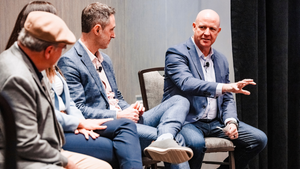ELECTRONIC CHECK-IMAGING SAVES TIME, MONEY FOR SHURFINEELECTRONIC CHECK-IMAGING SAVES TIME, MONEY FOR SHURFINE
YORK, Pa. -- By outsourcing an electronic check-imaging service, Nell's Corp. here has simplified the accounting process used for checks returned for not sufficient funds (NSF), while saving on bank fees and increasing collections.Now, when a customer writes a bad check at one of the retailer's nine supermarkets operating under the Shurfine Market banner, the Federal Reserve routs the check to an
December 18, 2000
MATTHEW W. EVANS
YORK, Pa. -- By outsourcing an electronic check-imaging service, Nell's Corp. here has simplified the accounting process used for checks returned for not sufficient funds (NSF), while saving on bank fees and increasing collections.
Now, when a customer writes a bad check at one of the retailer's nine supermarkets operating under the Shurfine Market banner, the Federal Reserve routs the check to an outside company for electronic imaging, rather than back to the retailer's depository bank. This allows Nell's access to an on-line image of every NSF check via a Web-based software application from CheckAgain, Herndon, Va., the firm that does the imaging.
This has been "working wonderfully," Donna Kemper, Nell's accounting manager, told SN. "Today, when a customer calls, I can look up the returned check in seconds, including the front and back image of the check," she explained. "So customer complaints can be handled right then and there. No calling the bank or anybody else."
She added that the on-line viewing application, from CheckAgain, Herndon, Va., allows her to see when a customer has bounced a check at other area retailers. "We were looking for something that gave us a broader base on customer verification," Kemper added. "If someone writes a bad check at Wal-Mart, we can see that and prevent them from writing a check at our stores."
Because NSF checks are routed by the Federal Reserve directly to CheckAgain rather than to Nell's depository banks, the retailer avoids NSF fees assessed by those banks. Nell's uses rubber stamps that contain a special code to endorse checks. Routing from the Federal Reserve is based on this code and "the retailer's depository banks never realize the checks bounced," said George Rice, director of sales, CheckAgain.
Shurfine has reduced NSF fees from its depository banks by an average of $3 per check, according to CheckAgain.
The system is also reaping labor savings for Nell's, Kemper said. She pointed to CheckAgain's collections service, which uses an electronic debit process to recover the original amount of each check plus an NSF fee on behalf of the retailer.
"In-house collections were so time-consuming," Kemper said. "This has taken off that burden."
If the money can't be collected from the customer within 30 days, the case goes to a collections agency. If the account is closed, it goes directly to collections. Before, it could have take three to five months to reach collections, Kemper noted.
"This leads to a high rate of recovery in a short period of time," Rice said. The retailer has increased its NSF recovery rate to 88%, according to CheckAgain.
Rice cited other ways in which the retailer has benefited from the service. The time it takes to open envelopes and key data into accounting systems and negative databases is eliminated. Also, reconciliation time is reduced "dramatically" by the centralized returns process because returned checks are not coming from multiple sources. "We have a separate depository bank for each store," Kemper noted.
She cited one challenge of using the rubber stamps, however. The routing code applied to the backs of checks is sometimes illegible at the Federal Reserve, according to Kemper. In that case, those NSF checks go back to the retailer's depository banks and the retailer gets charged, "but that's 1% of the time or less," Kemper noted.
Rice pointed out that CheckAgain can also program retailers' point-of-sale systems so that the cash register prints the routing code onto checks. About eight out of every 1,000 checks written at supermarkets bounce, Rice said.
Ultimately, "the collection rates by the depository banks have gone up and [CheckAgain] has saved me bank fees," Kemper said.
Revenue is generated for both Nell's and CheckAgain by the NSF fees assessed to customers. "Shurfine does not pay for any of this," Rice explained. "We make our money through a portion of the return check fee we charge to the consumer's account on the merchant's behalf."
About the Author
You May Also Like




